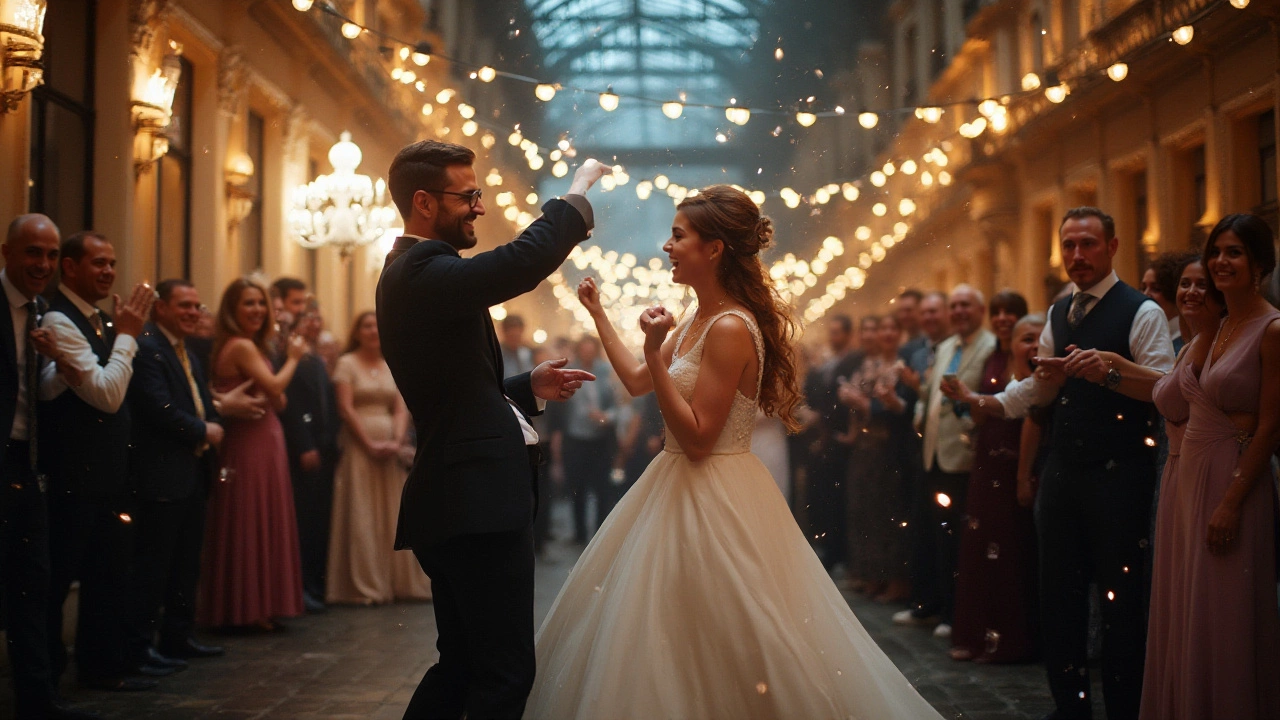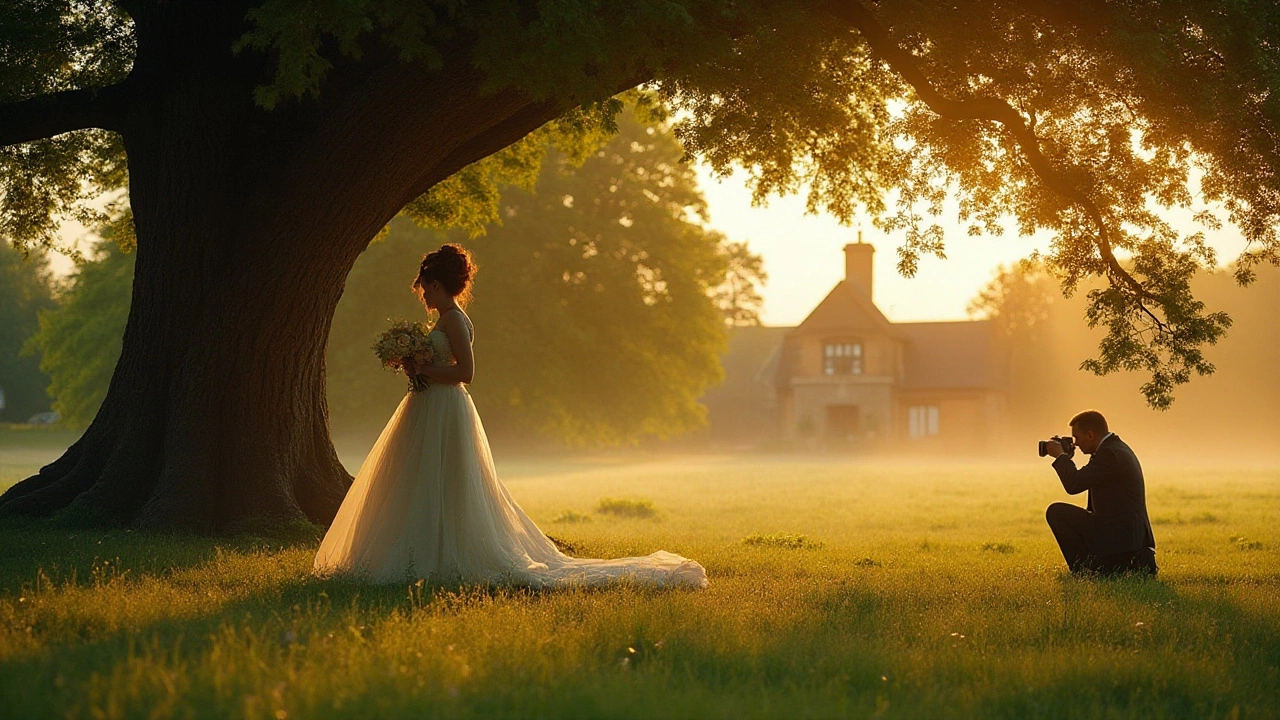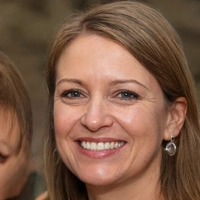Wedding photography is more than just capturing smiles and bouquets. It’s about telling a timeless story through a lens that blends artistry with emotion. The fees associated with hiring a wedding photographer often spark debate, yet behind the price tag lies a world of skill, precision, and dedication.
From the moment a photographer begins planning for a wedding shoot to the final touch-ups on each image, the process involves a myriad of elements that justify their rates. It's not just their creativity that you’re investing in but also their years of experience, technical prowess, and an eye for detail that turns an ordinary scene into an extraordinary memory.
- The Art and Skill Behind Wedding Photography
- The Cost of Equipment and Technology
- Time Commitment and Workflow
- Choosing the Right Photographer for Your Wedding
The Art and Skill Behind Wedding Photography
Capturing the essence of a couple's love story through wedding photography requires a delicate balance of artistry and technical skill. It's not just about snapping away at every opportunity but rather planning and understanding the perfect composition that makes each shot memorable. A professional wedding photographer adapts to various lighting conditions, creatively using natural and artificial light to enhance the mood and ambiance of the moment. They must anticipate emotions, capturing fleeting moments of joy, laughter, and tears without intruding or intervening. Their ability to direct and engage guests for group photos while maintaining a relaxed and genuine atmosphere is equally crucial.
The profession demands more than a good eye; it's about mastering the equipment. Cameras and lenses are the chief tools of the trade, and professionals spend years perfecting their craft through experience and continuous learning. The choice of lens can dramatically alter a photo's perspective and emotion, and seasoned photographers know how to switch seamlessly between them to suit the scene. They employ post-processing techniques that enhance photographs without altering their reality, making each image a glorified keepsake of the day. As renowned photographer Ansel Adams once said,
"You don’t make a photograph just with a camera. You bring to the act of photography all the pictures you have seen, the books you have read, the music you have heard, the people you have loved."This quote perfectly encapsulates how much of the photographer's personal experience and emotion are infused into their work.
Beyond skills, there lies the uniqueness of each wedding photographer's style. Some specialize in a candid, documentary approach, capturing people in natural states of enjoyment, while others prefer posed, fashion-inspired shots that highlight grandeur and elegance. The process of developing a personal style is a journey, one that reflects the artist's eye and vision, often inspired by a wide array of influences from film, art, and cultures worldwide. This personal touch is what distinguishes professionals and makes their work truly valuable. Whether it's the elegance of black and white contrasts or the vividness of color that attracts you, knowing the style that resonates with your idea of the perfect wedding album is a conversation worth having with your photographer.
The Cost of Equipment and Technology
Anyone who has ever dabbled in photography knows that capturing stunning images is far from a simple point-and-shoot affair. Professional wedding photographers invest heavily in top-tier equipment and cutting-edge technology. A high-quality camera alone, such as a Canon EOS R5 or a Nikon D850, can cost several thousand dollars. And it's not just about owning one camera; photographers often require backup bodies, each equipped with different lenses to capture various angles and lighting conditions during a fast-paced event like a wedding. Lenses are another major investment area, with specialty pieces like prime lenses or telephoto lenses costing upward of a few hundred to several thousand dollars each.
Beyond cameras and lenses, photographers rely on an arsenal of accessories that each serve a unique purpose. Top-notch flash setups help manage difficult lighting situations, while reflectors and diffusers work magic on outdoor shoots. Let’s not forget the digital components, from high-speed memory cards to the software platforms utilized to process the raw images. Software like Adobe Photoshop and Lightroom are essential tools of the trade, each with considerable subscriptions or licensing fees that stack up every year.
Successful wedding photography also means keeping up with the ever-evolving world of technology. With the rise of drones in capturing aerial shots, many photographers have widened their offerings, investing in flying cameras that come with their own sets of regulations and requirements. A drone that provides high-resolution images can cost anywhere from $1,000 to $4,000. Using drones requires not just financial investment but also time invested in mastering the controls and climate considerations.
A BBC article on technology in photography eloquently noted, "The magic really happens in post-production, where the true art of a photographer gets to shine through. What you see in a glossy wedding album is the culmination of hours of meticulous editing powered by sophisticated software and a steady hand."Adding to the complexity is the storage of these invaluable photos. Photographers often employ advanced redundancy systems to safeguard against data loss, operating multiple external hard drives or cloud solutions. These processes ensure that every valuable moment remains preserved for the couple to cherish forever.
Switching gears, let's not overlook the equipment’s lifespan. With constant use, inevitable wear and tear occur, leading to ongoing maintenance costs or replacement needs. These aspects accumulate into the overarching investment that photographers make to provide dreamy images that define their careers. As technology continues to advance, so do the ambitions of professionals in the field. Their dedication to quality over quantity, relentless pursuit of perfection, and high initial costs all merge to create an experience worth every penny.

Time Commitment and Workflow
The life of a wedding photographer is one that revolves around meticulous planning and an unwavering commitment to capturing perfection. When you hire a photographer, you're not just paying for the hours spent at the ceremony and reception. A significant amount of time is dedicated to pre-wedding preparations and post-processing, which often go unappreciated by those outside the field. The journey starts with a meeting to understand the bride and groom’s vision, followed by location scouting, which ensures that the photographer is familiar with the lighting and best spots in the venue. It’s a comprehensive process that requires not only understanding the technical needs of photography but also the emotional expectations of the couple.
On the day of the wedding, photographers arrive early to set up and capture the often-overlooked moments—the getting ready, the quiet anticipation, and the first looks. This can mean an entire day on their feet, hauling heavy gear, and anticipating each unfolding moment. The skill in predicting key moments comes with experience, signaling back to the investment in the photographer's expertise. But the work doesn’t end when the last dance concludes. For every hour spent photographing the wedding, there are multiple hours spent on culling, editing, and ensuring each shot is as beautiful as the memory it represents.
Post-production is arguably one of the most labor-intensive aspects of the professional photography workflow. This is where raw images are transformed into artful memories. Careful attention is given to color correction, exposure adjustment, and sometimes a little retouching. This stage can be time-consuming, often taking weeks to perfect a collection that the couple will cherish for a lifetime. According to a survey by WeddingWire, on average, photographers spend around 30 to 40 hours editing a single wedding.
Photographer Annie Leibovitz once said, "To make stunning photographs, you have to find the perfect moment—something that can never be rushed." This sentiment resonates deeply within the wedding industry, where capturing the essence of a couple's love story requires time and patience that transcends the day itself.
Understanding a photographer’s dedication to each phase of the wedding is crucial in appreciating their pricing. The time taken beyond the wedding day ensures that each final image reflects the couple's unique story, embodying the joy and love shared with friends and family. Choosing a wedding photographer isn't just a decision; it’s an investment in memories that will last a lifetime. When considering photographers, remember that their workflow is a nuanced balance of art, science, and heart, intended to enshrine one of the most significant days of a couple's life into a visual narrative that speaks volumes across generations.
Choosing the Right Photographer for Your Wedding
When it comes to capturing one of the most important days of your life, choosing the right photographer is a critical decision that can have a lasting impact. The right photographer can transform fleeting moments into timeless memories through their lens, skill, and artistry. The process of finding such a photographer, however, requires more than just browsing through portfolios online. It demands personal connection, understanding their style, and thoroughly evaluating their professional experience. To begin with, you should consider photographers whose previous work resonates with your personal aesthetic. Do you prefer candid shots that exude authenticity, or are posed, traditional portraits more your style? This personal reflection will help narrow down the candidates significantly.
Once you've identified photographers whose style aligns with your vision, it’s important to set up an initial consultation. This meeting is not just about pricing and packages but about establishing a rapport. Often, couples overlook the importance of feeling comfortable with their photographer, yet this ease is precisely what allows for natural and genuine photographs. Engage in a conversation about their previous work and experience, asking questions about how they handle unforeseen situations or challenging lighting conditions. A seasoned professional in wedding photography will not just list equipment but will share stories of past weddings, demonstrating their problem-solving skills and creativity under pressure.
In addition to chemistry, you should also consider logistics and financial aspects. Does the photographer offer packages that fit your budget? Some photographers may offer customizable packages or off-season discounts, providing quality service at a more affordable rate. It's essential to clarify what's included in the package—hours of coverage, number of photographs, and whether additional fees apply for albums or travel. Capturing your wedding involves more than just the day itself; post-processing is a significant part of the equation. Ask about their editing style and how long it typically takes them to deliver the final product.
Finally, never underestimate the power of reviews. Listening to the experiences of other couples can provide valuable insights and first-hand knowledge about the photographer's reliability, professionalism, and ability to deliver on promises.
"A picture is worth a thousand words, but a picture with the wrong photographer can be a thousand regrets," warns bridal industry expert Sarah Solis.Thoroughly researching and vetting your photographer will not just save you from potential disappointment but will also ensure that your wedding day memories are as special and enduring as the commitment you’re making.

